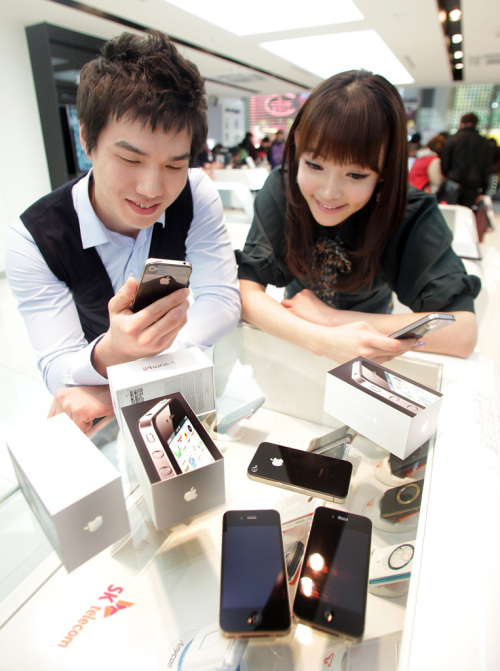
The three mobile carriers ― SK Telecom, KT and LG Uplus ― will be banned from charging new customers phone sign-up fees after 2015 under the new government’s drive to slash the financial burden on ordinary households.
In its policy briefing to President Park Geun-hye on Thursday, the Ministry of Science, ICT & Future Planning said it would ban the start-up fees in the mobile industry on a step-by-step basis.
The ministry plans to instruct the three companies to initially cut 40 percent of the current fees this year, 30 percent next year and the remaining 30 percent by the end of 2015.
Currently, SK Telecom charges newcomers 39,600 won ($35) in sign-up fees, LG Uplus 30,000 won and KT 24,000 won.
Science Ministry data showed that mobile phone consumers in only 10 countries out of the 34 members of the Organization for Economic Cooperation and Development are charged sign-up fees.
The ministry projected that customers would save a combined 500 billion won per annum.
Over the past few years, some consumer protection advocates have demanded a phase-out of the start-up fees, stressing that registration costs for the three companies are negligible.
Analysts predicted the mobile carriers would immediately take action to avert a sharp drop in their earnings.
Meanwhile, the new ministry is drawing attention. A group of scholars urged the new administration to establish a government branch that exclusively deals with issues related to the information and communications technology sector.
“The Park Geun-hye administration must revive the sectors of information, broadcast and telecommunications, which have been rather ignored in the past, by drafting a national future vision which focuses on ICT policies,” they said in a statement.
During the ministry’s policy briefing, President Park shared the view that the country must create a new growth engine and take the lead in the future through ICT.
The ministry aims for the country to boast the world’s fastest wireless and wired network by 2017 with the number of public Wi-Fi zones rising to 10,000 in 2017 from 2,000 in 2012, and gigabit speed Internet connections available in most parts of the country.
It also plans to extend its number of the top 1 percent most cited scientific research papers to 5,000 in 2017 from 1,268 in 2011.
The ministry also vowed to nurture scientific minds and nurture the knowledge sector.
By Kim Yon-se (kys@heraldcorp.com)
In its policy briefing to President Park Geun-hye on Thursday, the Ministry of Science, ICT & Future Planning said it would ban the start-up fees in the mobile industry on a step-by-step basis.
The ministry plans to instruct the three companies to initially cut 40 percent of the current fees this year, 30 percent next year and the remaining 30 percent by the end of 2015.
Currently, SK Telecom charges newcomers 39,600 won ($35) in sign-up fees, LG Uplus 30,000 won and KT 24,000 won.
Science Ministry data showed that mobile phone consumers in only 10 countries out of the 34 members of the Organization for Economic Cooperation and Development are charged sign-up fees.
The ministry projected that customers would save a combined 500 billion won per annum.
Over the past few years, some consumer protection advocates have demanded a phase-out of the start-up fees, stressing that registration costs for the three companies are negligible.
Analysts predicted the mobile carriers would immediately take action to avert a sharp drop in their earnings.
Meanwhile, the new ministry is drawing attention. A group of scholars urged the new administration to establish a government branch that exclusively deals with issues related to the information and communications technology sector.
“The Park Geun-hye administration must revive the sectors of information, broadcast and telecommunications, which have been rather ignored in the past, by drafting a national future vision which focuses on ICT policies,” they said in a statement.
During the ministry’s policy briefing, President Park shared the view that the country must create a new growth engine and take the lead in the future through ICT.
The ministry aims for the country to boast the world’s fastest wireless and wired network by 2017 with the number of public Wi-Fi zones rising to 10,000 in 2017 from 2,000 in 2012, and gigabit speed Internet connections available in most parts of the country.
It also plans to extend its number of the top 1 percent most cited scientific research papers to 5,000 in 2017 from 1,268 in 2011.
The ministry also vowed to nurture scientific minds and nurture the knowledge sector.
By Kim Yon-se (kys@heraldcorp.com)



![[AtoZ into Korean mind] Humor in Korea: Navigating the line between what's funny and not](http://res.heraldm.com/phpwas/restmb_idxmake.php?idx=644&simg=/content/image/2024/04/22/20240422050642_0.jpg&u=)
![[Exclusive] Korean military set to ban iPhones over 'security' concerns](http://res.heraldm.com/phpwas/restmb_idxmake.php?idx=644&simg=/content/image/2024/04/23/20240423050599_0.jpg&u=20240423183955)



![[Graphic News] 77% of young Koreans still financially dependent](http://res.heraldm.com/phpwas/restmb_idxmake.php?idx=644&simg=/content/image/2024/04/22/20240422050762_0.gif&u=)
![[Herald Interview] Why Toss invited hackers to penetrate its system](http://res.heraldm.com/phpwas/restmb_idxmake.php?idx=644&simg=/content/image/2024/04/22/20240422050569_0.jpg&u=20240422150649)





![[Exclusive] Korean military to ban iPhones over security issues](http://res.heraldm.com/phpwas/restmb_idxmake.php?idx=652&simg=/content/image/2024/04/23/20240423050599_0.jpg&u=20240423183955)



![[Today’s K-pop] Ateez confirms US tour details](http://res.heraldm.com/phpwas/restmb_idxmake.php?idx=642&simg=/content/image/2024/04/23/20240423050700_0.jpg&u=)